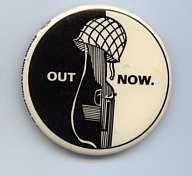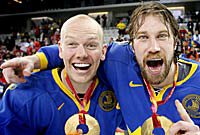What might have been the consequences for Canada
if Stephen Harper and the Conservatives had won a majority in the 2006 federal election? What if the South had won the American Civil War? How would history have been different if the Axis powers had won the Second World War? What would the world be like today if the Black Death had wiped out almost everyone in Europe in the fourteenth century? One of my favourite types of fiction, a sub-genre of science fiction, is called
alternative history and involves just these sorts of questions. (Pedant’s note: It’s also called
alternate history by people who don’t know the difference between “
alternative” and “
alternate” – although it could be argued that “alternate” is acceptable if it is intended, which it probably is not, to mean “substitute” or “back-up” rather than referring, as “alternative” does, to another
possibility.) Indeed, there’s a good web site, called
Uchronia, devoted to listing and describing alternative-history stories.

I recently read Philip Roth’s
The Plot against America. The novel is set in a world where
Charles Lindbergh defeats Franklin Roosevelt for the U.S. presidency in 1940. Lindbergh, an isolationist sympathetic to Nazi Germany, keeps the U.S. out of World War Two, and under his administration anti-Semitism flourishes. As an alternative-history story, this is an unusual one – not because of its particular counter-factual premise, but because the premise is firmly in the background for much of the novel, and only gradually works its way to the fore. The story is told in the first person, from the point of view of one Philip Roth, and recounts at length his growing up in a Jewish neighbourhood in Newark, New Jersey. This perspective lends an air of authenticity to the external menace on the horizon.
What is less believable is the way the fascist threat suddenly vanishes at the end of the novel and history is shunted back on to its familiar tracks, even to the point that Robert Kennedy is assassinated at the same time and in the same circumstances as in our world – a fact that seems highly improbable in light of the earlier upheavals in the political life of the country. Also improbable is that on Monday, October 5, 1942,
Whitey Kurowski of the St. Louis Cardinals hits a ninth-inning home run to give his team a four-games-to-one World Series victory over the New York Yankees – just as in our world. I wonder whether Roth’s insistence on these details is meant to imply that his alternative world is a kind of bad dream overlying the “real” world. But it could simply be that he has just not thought through very well the implications of a major historical change. Odd too is the way Roth at times, and to no discernible purpose, gives great long lists of names of people attending various events. And all too often I would find one of his sentences so long and complex – likely including multiple dashes – that at the end I would have to go back and search for the verb in order to make sense of the whole thing.

For me the classic alternative- history novel is
Philip K. Dick’s
The Man in the High Castle, originally published in 1962. The Axis powers have won World War Two. The eastern and western parts of the former U.S.A. are under the control of Germany and Japan respectively. Martin Bormann, successor to Hitler, dies and a power struggle breaks out over who is to replace him as leader of the Reich. But the novel is less about these larger events than about the struggles of ordinary people to get by and make sense of their lives. The story unfolds from multiple perspectives of characters who live in the Pacific States of America or in the non-aligned Rocky Mountain States, and whose lives are intertwined. The Chinese
I Ching is widely consulted as an oracle, and a best selling novel, banned in German territory, portrays a world in which the Axis lost the war. Almost nothing is what it appears to be on the surface, from historical artifacts to personal identities. Dick gets inside the heads of his characters and lets us understand them in ways they often fail to do themselves. Although evil is an almost palpable presence in their lives, their ability to see the moral path is typically obscured by complexity and illusion. To my mind Dick's novel is both subtler and more exciting than Roth's.
A few more recommended works of alternative history: Robert Harris’s
Fatherland is a police thriller set in a victorious Nazi Germany in the 1960s. Ward Moore’s
Bring the Jubilee, set in a world where the South won the American Civil War, is both an alternative history and a time-travel story.
The Years of Rice and Salt, by Kim Stanley Robinson, is a sweeping narrative spanning centuries, beginning from the Black Death that wiped out Christian civilization in Europe in the Middle Ages and set the world on a different course. And the remarkable
For Want of a Nail, by Robert Sobel, is
a lengthy scholarly history textbook from a world in which the eighteenth-century rebellion in Britain’s American colonies was successfully put down.















